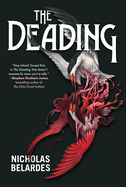
Nicholas Belardes's debut novel, The Deading, is an uncannily realized dystopian horror story that follows one small, seaside town's dissolution in the face of a mysterious environmental contagion.
The first sign of trouble for the residents of Baywood is a strange snail infestation at the local oyster farm. Soon, most of Baywood--including introverted birdwatcher Blas's mother and brother--are infected with a terrifying contagion. Its victims seize and become prone, a phenomenon the local youth call "deading" after a former Internet trend. When the government quarantines the once peaceful community, it quickly unravels. Blas distances himself from his classmates as they start an extremist cult, called the Risers, who turn deading into a sacrificial religion. The Risers' use of the collective first-person plural "we" reminds readers of the intimate relationship between nature and society, the environment and humankind's collective psyches.
Escape isn't so easy in a world turned fanatical from environmental disaster. Belardes infuses The Deading with a healthy dose of grotesquerie, and he crafts a disturbing landscape of complicity and self-mutilation, of inescapable cycles of domination. But for as much brutality as exists in this dystopic Baywood, it goes hand in hand with wonder, too, often in the form of the relationship Blas has with birding, which is framed in awe. Even at the height of the novel's horror, Blas is struck momentarily still by "the collective hum of wingbeats that follow one another in what has turned to a fiery pink-and-orange dusk and rapidly descending night," and a "continuing dark spiral of wings." In this eclipse of wings, perhaps the novel's most breathless moment, Belardes finds beauty. --Alice Martin, freelance writer and editor

